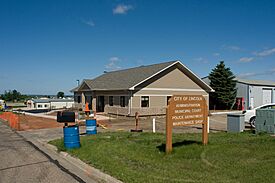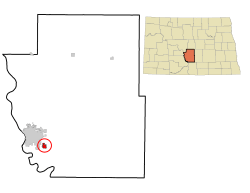Lincoln, North Dakota facts for kids
Quick facts for kids
Lincoln, North Dakota
|
|
|---|---|

Administrative Building in Lincoln
|
|

Location of Lincoln, North Dakota
|
|
| Country | United States |
| State | North Dakota |
| County | Burleigh |
| Founded | 1977 |
| Incorporated | July 12, 1977 |
| Area | |
| • Total | 1.551 sq mi (4.017 km2) |
| • Land | 1.551 sq mi (4.017 km2) |
| • Water | 0.000 sq mi (0.000 km2) |
| Elevation | 1,690 ft (515 m) |
| Population
(2020)
|
|
| • Total | 4,257 |
| • Estimate
(2023)
|
4,426 |
| • Density | 2,850/sq mi (1,102/km2) |
| Time zone | UTC–6 (Central (CST)) |
| • Summer (DST) | UTC–5 (CDT) |
| ZIP Code |
58504
|
| Area code(s) | 701 |
| FIPS code | 38-46640 |
| GNIS feature ID | 1036131 |
| Sales tax | 6.5% |
Lincoln is a city in Burleigh County, North Dakota, United States. It is a suburb of the nearby city of Bismarck. Lincoln is also part of the larger Bismarck-Mandan area.
In 2020, about 4,257 people lived in Lincoln. This makes it the 15th largest city in North Dakota. Lincoln was officially started in 1977.
Contents
History of Lincoln
A place called Lincoln Township was shown on maps as early as 1872. This was around the time Bismarck, which was then called Edwinton, was first planned out. People tried to officially create a town or city named Lincoln many times, even in 1965.
What we know as the City of Lincoln today began as a housing area in 1972. It was called Fort Lincoln Estates and had 300 acres with 492 lots for homes. At first, it was part of Apple Creek Township. Billy Rippley was the main person who developed this area. By 1973, 24 homes had been built.
In 1973, Lincoln and other parts of Apple Creek Township joined the Bismarck Public School district. This meant students from Lincoln could go to schools in Bismarck.
On July 12, 1977, residents voted to make Lincoln an official city. The vote was 312 for and 185 against.
Lincoln Elementary School opened in 2014. This was the first public school actually located in the city of Lincoln. Before this, students had to take buses to schools in Bismarck.
Geography of Lincoln
Lincoln is located in North Dakota. The city covers a total area of about 3.860 square miles (about 10 square kilometers). All of this area is land, meaning there are no large lakes or rivers within the city limits.
Population and People
| Historical population | |||
|---|---|---|---|
| Census | Pop. | %± | |
| 1980 | 656 | — | |
| 1990 | 1,132 | 72.6% | |
| 2000 | 1,730 | 52.8% | |
| 2010 | 2,406 | 39.1% | |
| 2020 | 4,257 | 76.9% | |
| 2023 (est.) | 4,426 | 84.0% | |
| U.S. Decennial Census 2020 Census |
|||
The population of Lincoln has grown a lot over the years. In 1980, only 656 people lived there. By 2020, the population had reached 4,257 people. This shows how much the city has expanded.
2020 Census Information
According to the 2020 census, there were 4,257 people living in Lincoln. There were 1,525 households, which are groups of people living together in one home. About 1,134 of these households were families.
The city had about 1,612 housing units. The population density was about 2,744.7 people per square mile (about 1,060 people per square kilometer). This means there were many people living close together in the city.
Most people in Lincoln are White, making up about 88.1% of the population. Other groups include African American (1.2%), Native American (3.8%), and Asian (0.3%). About 5.9% of people identified as being from two or more races. People of Hispanic or Latino background made up 3.1% of the population.
2010 Census Information
In 2010, Lincoln had 2,406 people. There were 821 households, and 660 of them were families. The average household had about 2.93 people, and the average family had about 3.22 people.
About 51.3% of households had children under 18 living with them. Most households (63.8%) were married couples living together.
The median age in Lincoln was 29.6 years old. This means half the people were younger than 29.6, and half were older. About 32% of the residents were under 18 years old.
Education in Lincoln
Lincoln is part of the Bismarck Public Schools district. Students living in Lincoln attend specific schools. These include Lincoln Elementary School, Wachter Middle School, and Bismarck High School.
Climate in Lincoln
Lincoln has a type of weather called a humid continental climate. This means the city experiences big changes in temperature throughout the year. Summers are usually warm to hot, and can sometimes be humid. Winters are cold, and can even be very cold.
See also
 In Spanish: Lincoln (Dakota del Norte) para niños
In Spanish: Lincoln (Dakota del Norte) para niños
 | Stephanie Wilson |
 | Charles Bolden |
 | Ronald McNair |
 | Frederick D. Gregory |

